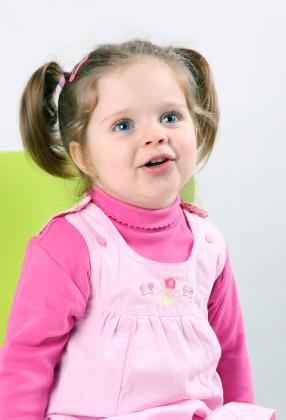
Knowing what to expect regarding toddler speech can be a topic of anxiety for many parents. There are many societal and environmental pressures that add to the mounting tension within a home where a toddler is slow to speak. It's not foolish to wonder exactly where your child's speech should be in comparison to other children. However, it can be detrimental to add pressure to a child who is simply developing differently in these areas. The controversy lies somewhere between what the "experts" say and what exactly makes the "experts" experts.
Charting Toddler Speech
Most children, by one year of age, will have started to sound out a few words. Their pronunciation may be off, or their recognition of proper word usage may also be misguided. Still, their diligent efforts towards communication are noted delightfully by parents. As a child approaches two years of age, combination words have typically come into view. Full sentence communication is rare by two, although some speech therapists may expect this of toddlers.
It cannot be stated enough that every child develops differently. Only children may develop in a different fashion than a child within a larger family. Some children may not say their first words until they are two and a half years old. Although this is not the norm, it does not necessarily imply that your child is mentally abnormal. There are toddlers in the world who fail, early on, to see a point in verbal communication. Many parents experience their first sigh of relief when the child bursts into speech at age three. These types of communication delays do happen. Moreover, many experts suggest that boys are slower to communicate than girls. This is not a hard and fast rule, but it is an opinion forged by years of observation.
If you are consulting with a speech therapist regarding your toddler, you may also want to consider the experiences of fellow friends and family members who have children. Many speech therapists may have ideas regarding your toddler's speech development that are unrealistic in comparison to the bulk of your peers. This can cause needless worry in a home.
Emotional Development
Some children will develop very slowly regarding their speech. What is important to note in such cases is that there needs to be a steady improvement in speech over time. There should be progress as the months go by. If a child is learning to talk slower than his peers, but his speech is improving steadily over time, then there may be no cause to worry. Sometimes speech is tied to the emotional condition and maturity of a child. Any teacher in a classroom can tell you that students differ from one another. There may be an exceptionally bright child in the classroom who doesn't perform well academically merely because the child is not emotionally equipped for the responsibilities of school. This kind of behavior can also manifest itself when it comes to toddler speech. If a child doesn't want to speak, he will usually not speak. In some cases, a speech therapist will do more to frustrate a child, than she will to help.
When to Worry About Toddler Speech
This is not to say that parents shouldn't be concerned if their child isn't speaking at all by a certain age. There are simply too many cases of autism occurring in the United States for the average parent not to worry. Baby Center puts together a decent list of indications that a child may need a speech therapist. Though speech therapy should not be seen as a miracle cure, it can be very helpful for children who are merely slow in their language development. Parents don't necessarily have enough time to focus on their child's speech needs, in which case, the therapist can be extremely valuable.
A child who begins to speak, but later regresses in his speech is also a case for concern. In many circumstances, the hearing may be impaired by ear infections or simply a buildup of wax. Children who experience a drastic change in any area of development should always be investigated by a professional.
Still, the case of autism needs to be addressed because the rates of this condition are soaring within some parts of the United States. Delayed speech is not the only symptom of autism, and if impaired speech is not accompanied by any other awkward behavior, it is unlikely that your child is autistic. However, it is not a bad idea to have your child evaluated by his pediatrician or any other recommended professional. The trouble with evaluations, of course, is that autism is not always easy to categorically diagnose in children less than two to three years of age. Again, some children develop so slowly that it is not simple to assess their progress. This means that there can still be confusion regarding such a diagnosis, particularly when it comes to toddler speech. In conclusion, the first step that any concerned parent needs to take is to talk to his or her child's pediatrician about any possible speech problems a child may exhibit.







